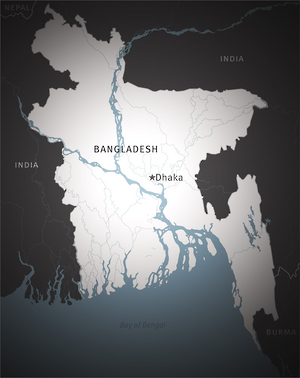Bangladesh: End Harassment of War Crimes Defense Counsel
Armed Raid on Defense Offices Gross Interference with Trial Process
The raid, without any justification being given, by armed police on the offices of a prominent defense lawyer in the war crimes trials taking place in Bangladesh is a grave affront to the basic tenets of fair trials. The Bangladeshi government should take action against those who ordered the raid on the offices of defense counsel Mohammed Tajul Islam and take steps to ensure that lawyers are not subject to threats and intimidation.

“A raid by armed intelligence officers on the offices of defense lawyers without a warrant and for no discernible reason marks a very dangerous turn in an already flawed process,” said Brad Adams, Asia director at Human Rights Watch. “The Bangladeshi government needs to publicly condemn this action or risk the appearance of being responsible for this egregious violation of fair trial standards.”
On October 9 at around 4:30 pm, 10-12 police officers who identified themselves as members of the Detective Branch of the police gathered outside the Dhaka law offices of Islam. When questioned about their presence by lawyers in the office, they denied any interest in the chambers, but afterwards entered the offices saying that they wanted to search the premises. Lawyers present at the office demanded that they produce a search warrant, but the officers could not produce one. The officers then started questioning staff and clients who were present in the offices, taking down names and addresses. The police left of their own accord after about twenty minutes.
On October 10 defense counsel requested both the first and the second trial chambers of the International Crimes Tribunal (ICT) to investigate the raid. The second chamber directed them to file a written application and to make a General Diary complaint to the police. The presiding judge in the first trial chamber said the matter was beyond his authority.
Lawyers representing the accused before the ICT have previously reported being harassed by state officials and threatened with arrests.
Abdur Razzaq, a senior lawyer who heads many of the war crimes trials, has been harassed, threatened with criminal charges, and reports ongoing surveillance of his home and office. Defense lawyers allege that they are often unable to bring witnesses to court because of threats and intimidation of witnesses by persons working for the prosecution.
Both Bangladeshi and international law recognize the importance of the need to protect the ability to work freely without intimidation, whether on the prosecution side or the defense. In the absence of such protection, the accused are unable to freely communicate with their counsel, and counsel are then unable to represent their clients fully. The related concept of lawyer-client privilege is similarly undermined by this kind of harassment and intimidation.
Human Rights Watch repeated its call for the establishment of a Defense Office, similar to those established in international criminal tribunals. A Defense Office would help ensure that the core principle of “equality of arms” for both sides is recognized, and thus would go a long way to establishing fairness in ICT proceedings. Defense Offices are accessible only to authorized members of the defense teams, and all evidence and work product in those offices are considered privileged and protected. The creation of a Defense Office, properly staffed and supported, would give a clear signal that the defense teams should be treated as an equal and indispensable of a fair trial process.
The ICT, which Human Rights Watch has long supported so long as fair trials are carried out, was set up to provide justice for victims of atrocities during the 1971 war of independence from Pakistan. Human Rights Watch has however, expressed concern over certain aspects of the ICT Act, and has called on the government to rectify these flaws. These include:
● Amending the definition of crimes to articulate more clearly the relevant definitions of war crimes, crimes against humanity, and genocide as they existed under domestic or international law at the time of the offense;
● Amending the act to allow challenges to the constitution of the tribunal and the appointment of its members;
● Amending the act and rules to ensure that the due process and rights of the accused are consistent with Bangladesh's international legal obligations;
● Repealing Article 47(A) of the Bangladesh Constitution to allow the accused full protection of their constitutional rights, including the right to enforce their fundamental rights under Article 44, which protects fundamental rights; and
● Creating an effective and well thought out victim and witness protection plan well ahead of the trials, to address protection and support needs before, during, and after proceedings.
“It is only when both sides are treated as equals, and when codes and laws of professional conduct are strictly adhered to, that victims of atrocities and the wider public can be confident that the justice they have sought for so long is based on a legitimate trial process,” said Adams.
Source: Human Rights Watch
- 364 reads
Human Rights
Ringing FOWPAL’s Peace Bell for the World:Nobel Peace Prize Laureates’ Visions and Actions

Protecting the World’s Cultural Diversity for a Sustainable Future

The Peace Bell Resonates at the 27th Eurasian Economic Summit

Declaration of World Day of the Power of Hope Endorsed by People in 158 Nations

Puppet Show I International Friendship Day 2020

